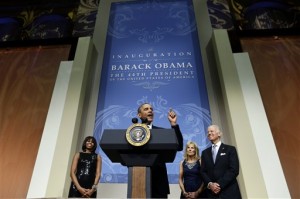Obama speech sets stage for looming policy fights

President Barack Obama and first lady Michelle Obama, Vice President Joe Biden and Jill Biden, speak to supporters and donors at an inaugural reception for the 57th Presidential Inauguration at The National Building Museum in Washington, Sunday, Jan. 20, 2013. AP
WASHINGTON — US President Barack Obama has prepared a second inaugural speech that broadly lays out his vision for the country’s future, setting the stage for looming debates over taxes, guns, immigration and other issues while leaving the details for another day.
Monday’s speech, to be given right after Obama takes an oath to “faithfully execute the office of the President of the United States” outside the Capitol, includes no new policy, aides say. Instead, the president plans to use the moment as it traditionally has been used in most of the 56 previous inaugurations — to talk about founding American values and their importance to the country’s success today.
The inauguration gives Obama the chance to command global attention at a level that’s rare even for the leader of the free world.
Aides say he has been working on the speech since early December, and he clearly has an eye toward his place in history. He invited presidential historians to the White House and chose to take his oath on Bibles owned by Abraham Lincoln and Martin Luther King Jr.
His words come on the brink of a second term with no shortage of tough battles. Obama may reference last month’s Connecticut school shooting that pushed gun control to the top of his agenda. He may speak of a need to tackle comprehensive immigration reform and a need to bring US troops home from Afghanistan.
Article continues after this advertisementWhite House advisers see the inaugural speech as the opportunity for the president to discuss his agenda for the next four years in broad terms. The next major opportunity will be at the State of the Union address Feb. 12, when aides say Obama will discuss specific policy proposals.
Article continues after this advertisementSenior adviser Robert Gibbs said Obama will use his address to communicate that “we’re going to move beyond what has paralyzed this town for so long.”
Gibbs said Obama wants members of both parties, Democratic and Republican, to “lay aside their partisanship” to solve protracted problems like budget, taxes and spending, gun violence and immigration. Gibbs said the president will tell the country that much is possible “if we sit down long enough and work together and talk together.”
Gibbs told CBS on Monday, “I think he feels very comfortable with what he’s got … and understands the moment that he and the country are in, and is anxious to get started.”
Inaugural addresses are not typically partisan, and White House aides say Obama doesn’t intend to call out his political opponents. But they say he will stand up for his values and vision that were supported by the majority of voters in the November election.
Obama’s prepared text notes that spirited debate is a hallmark of a vibrant democracy, aides say, but that the country’s leaders can’t let disagreement prevent them from finding common ground to move the country forward. The president also plans to encourage Americans to continue making their voices heard to shape the debate as policy is made, aides said.